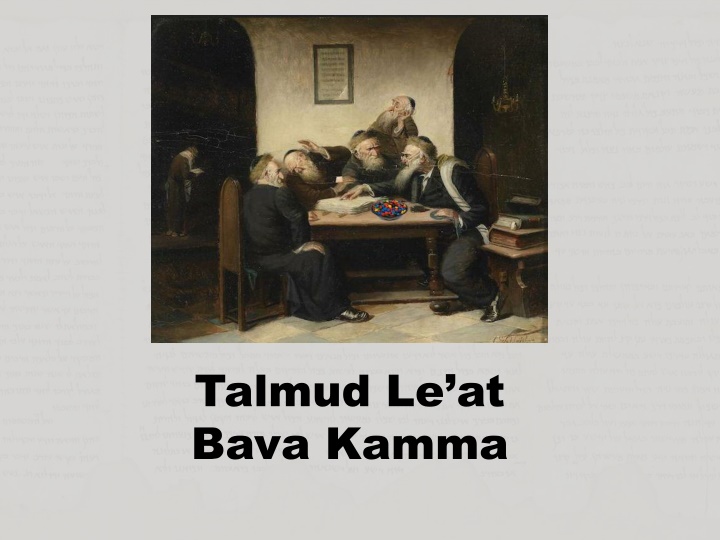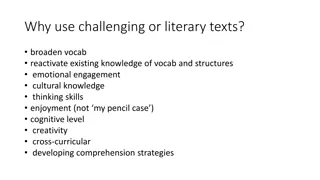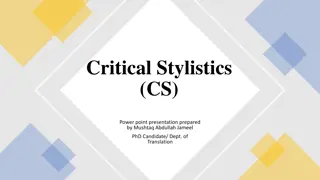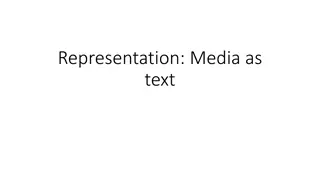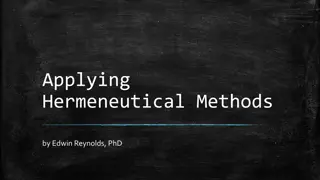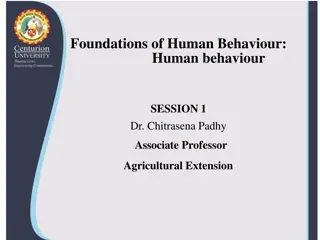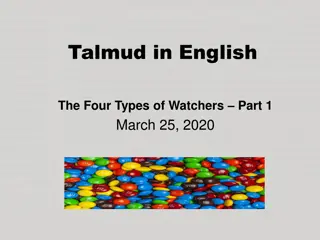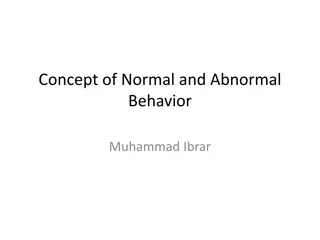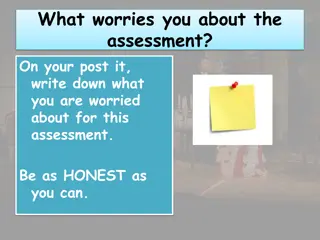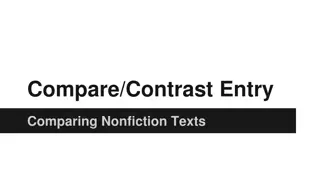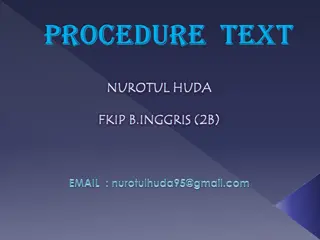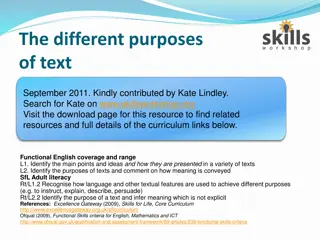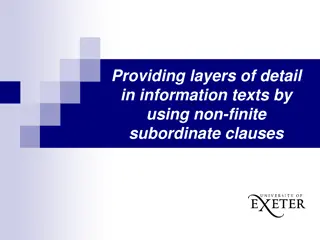Insights of Ox Behavior in Talmudic Texts
Nuanced meanings of "Ox" as "Horn," "Foot," and "Tooth" in Talmudic teachings. Discover the distinctions between innocent and dangerous oxen, primary and secondary behaviors, and their implications on legal interpretations.
Download Presentation

Please find below an Image/Link to download the presentation.
The content on the website is provided AS IS for your information and personal use only. It may not be sold, licensed, or shared on other websites without obtaining consent from the author.If you encounter any issues during the download, it is possible that the publisher has removed the file from their server.
You are allowed to download the files provided on this website for personal or commercial use, subject to the condition that they are used lawfully. All files are the property of their respective owners.
The content on the website is provided AS IS for your information and personal use only. It may not be sold, licensed, or shared on other websites without obtaining consent from the author.
E N D
Presentation Transcript
Talmud Leat Bava Kamma
Review We learn from a baraita that the Primary "Ox" means "Horn", "Foot" and "Tooth" 3 prooftexts that show that Horn means Goring Two types of ox: Tam (innocent) vs Muad (dangerous) 4 secondaries of Horn: Pushing, Biting, Crouching and Kicking All Horn secondaries are equal to the primary Talmud Le'at - 04 2
Damagers Fire Pit Maveh Ox Foot Horn Tooth Primary Secondary Pushing Biting Crouching Kicking Talmud Le'at - 04 3
Bava Kamma 2b ? . - " " " " "Tooth" and "Foot"--where are they written? As it is taught: "And he shall send forth" (Exodus 22:4): this refers to Foot. And it also says, "That send forth the feet of the ox and the donkey" (Isaiah 32:20). Talmud Le'at - 04 4
Exodus 22:4 - , - , - If a man will lead [an animal], field or vineyard, and he sends forth his animal and it consumes the field of another Talmud Le'at - 04 5
Isaiah 32:20 - - , - Happy are they that sow beside all waters that send forth the feet of the ox and the ass. Talmud Le'at - 04 6
Bava Kamma 2b : " " "And it shall consume": this refers to the tooth and it also says, "As the tooth consumes until it is all gone" (I Kings 14:10). Talmud Le'at - 04 7
Exodus 22:4 , - , - , - If a man will lead [an animal], field or vineyard, and he sends forth his animal and it consumes the field of another Talmud Le'at - 04 8
I Kings 14:10 - , - ; , , - Therefore, behold, I will bring evil upon the house of Jeroboam, and will cut off from Jeroboam every man-child, and him that is shut up and him that is left at large in Israel and will utterly sweep away the house of Jeroboam as consumes the tooth until it is gone as one sweeps away the dung until it is gone Talmud Le'at - 04 9
Mazel Tov! You have completed your first daf! Talmud Le'at - 04 10
Bava Kamma 3a " " " ? " " " The Master said: "And he shall send forth" (Exodus 22:4): this refers to the foot. And it also says, "That send forth the feet of the ox and the donkey" (Isaiah 32:20). The reason that the Merciful One writes, "That send forth the feet of the ox and the donkey" but were it not for this, how else could you interpret the phrase? Talmud Le'at - 04 11
Exodus 22:4 - , - , - If a man will lead [an animal], field or vineyard, and he sends forth his animal and it consumes the field of another Talmud Le'at - 04 12
Bava Kamma 3a , , If Horn, it is already written If Tooth, it is already written Talmud Le'at - 04 13
Bava Kamma 3a : ! " " It was necessary! You might have thought that both refer to the tooth: the one where it entirely destroys the object and the other were it does not completely destroy the object; Thus he teaches us Talmud Le'at - 04 14
Bava Kamma 3a ? Now that we have established that it refers to the Foot, from where do we know that one is liable for the Tooth even if it does not destroy the entire object? Talmud Le'at - 04 15
Bava Kamma 3a For it is similar to the Foot just as Foot, it does not matter if it destroys the object or not, so too Tooth, it does not matter if it destroys the object or not. Talmud Le'at - 04 16
Bava Kamma 3a " " " ? " " " The Master said: "And it shall consume" (Exodus 22:4): this refers to the Tooth and it also says, "As the tooth consumes until it is all gone" (I Kings 14:10) The reason that the Merciful One writes, "As the tooth consumes until it is gone" but were it not for this, how else could you interpret the phrase? Talmud Le'at - 04 17
Bava Kamma 3a . . , , If Horn, it is already written. If Foot, it is already written. Talmud Le'at - 04 18
Exodus 22:4 - , - , - If a man will lead [an animal], field or vineyard, and he sends forth his animal and it consumes the field of another Talmud Le'at - 04 19
Bava Kamma 3a : ! " " It was necessary! You might have thought this and this refer to the Foot: and one is where it goes on its own and one is where it does not go on its own Thus he teaches us Talmud Le'at - 04 20
Bava Kamma 3a ? Now that we have said that it refers to the Tooth, from where do we derive "the foot goes on its own"? Talmud Le'at - 04 21
Bava Kamma 3a " It is similar to the Tooth; just as Tooth, there is no difference whether it was sent or went on its own so as Foot, there is no difference whether it was sent went on its own. Talmud Le'at - 04 22
Bava Kamma 3a " " " " " " " " The reason that the Merciful One writes, "And he shall send forth," and we would not need, "And it shall consume," for it would imply both Foot and Tooth? It implies the Foot, as it is written, "That send forth the feet of the ox and the donkey" (Isaiah 32:2) And it also implies the Tooth, as it is written, "And the teeth of beasts will I send upon them" (Deuteronomy 32:24)? Talmud Le'at - 04 23
Deuteronomy 32:24 - - . - The wasting of hunger, and the devouring of the fiery bolt, and bitter destruction; and the teeth of beasts will I send upon them, with the venom of crawling things of the dust. Talmud Le'at - 04 24
Bava Kamma 3a " If not for the extra verse, I would have said either this or that: If Foot, as the damage done by it is frequent, If Tooth, as the damage done by it gives benefit. Talmud Le'at - 04 25
Bava Kamma 3a , ? Since they are equal, let both be included, for which one could you exclude? Talmud Le'at - 04 26
Bava Kamma 3a ! , " " It is necessary! You might have thought that he is liable only when he sends forth, but if it goes out on its own, no. Thus it teaches us. Talmud Le'at - 04 27
Vocabulary Hiddush (Hiddushim) - "New" (NOVELL ) "obligation imposed upon us to search through the subjects of the Torah and the precepts and bring to light their hidden contents" Nachmanides Talmud Le'at - 04 28
Bava Kamma 3a ? The secondary of Tooth, what is it? When it rubbed itself against a wall for its own pleasure or when it spoiled fruits for its own pleasure. Talmud Le'at - 04 29
Bava Kamma 3a ? Why is Tooth different? For just as it benefits by its damage, and it is your possession and it is under your control, these too it benefits by its damage, and it is your possession and it is under your control Talmud Le'at - 04 30
Bava Kamma 3a Rather, the secondary of Tooth is equivalent to the Tooth; and when R. Papa made his statement, it was in reference to the secondary of Foot. Talmud Le'at - 04 31
Bava Kamma 3a ? What is the secondary of Foot? When it did damage with its body while walking with its hair while walking with a bridle upon it with a bit in its mouth with the bell on its neck Talmud Le'at - 04 32
Bava Kamma 3a ? Why Foot different? the damage is common and it is in your possession and under your control these too, their damage is common and they are in your possession and under your control Talmud Le'at - 04 33
Bava Kamma 3a Rather the secondary of Foot is equal to Foot, and when R. Papa made his statement, it was in reference to the Pit. Talmud Le'at - 04 34
